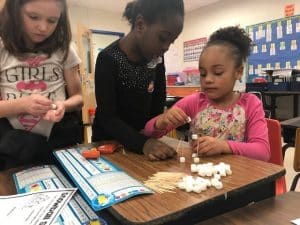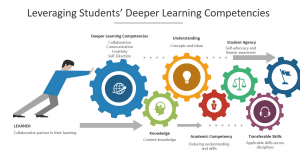Highlighting Deeper Learning Competencies in New Hampshire
CompetencyWorks Blog
 It is hard to argue the importance that being a strong collaborator, an articulate communicator, a self-directed learner, and a creative problem solver has on a person’s success in today’s world. In fact, a recent analysis by Valerie Strauss from the Washington Post on an article written by Cathy Davidson highlighting how Google culled data to determine the most important qualities of its top employees and found that the top seven were non-academic cognitive competencies, or success skills. Coaching, communicating and listening, empathy, critical thinking, problem solving, and making connections across complex ideas all came out on top.
It is hard to argue the importance that being a strong collaborator, an articulate communicator, a self-directed learner, and a creative problem solver has on a person’s success in today’s world. In fact, a recent analysis by Valerie Strauss from the Washington Post on an article written by Cathy Davidson highlighting how Google culled data to determine the most important qualities of its top employees and found that the top seven were non-academic cognitive competencies, or success skills. Coaching, communicating and listening, empathy, critical thinking, problem solving, and making connections across complex ideas all came out on top.
In a competency-based system, we must hold both academic competencies AND these deeper learning competencies, or success skills, as integral in preparing our graduates to be successful in work, college, and life.
But how have our schools historically helped students progress in these areas? Quite simply, we haven’t. In the words of one student in relation to these competencies, “I got a bad grade on (collaboration), but I never knew what it meant, and I was never told what I needed to do differently to get better at it.”
New Hampshire, for the past three years, has been focusing on how these incredibly important deeper learning competencies can be levers for students’ success. As we have shared in a number of articles (for example, please see first, second, third, and fourth in a series of articles reflective of the integration of these competencies in a school), it has become crystal clear the impact this increased focus integrating what we in New Hampshire call “Work Study Practices” into curriculum, instruction, and assessment has had in and out of the classroom.
The impetus for this deeper dive into these competencies came about from the first year of New Hampshire’s PACE (Performance Assessment of Competency Education) effort. Recognizing that these non-academic competencies were critical to success in a competency-based system, it was included as part of the PACE process. But the four original participating schools soon found out just how varied their approaches were, and how limited our understanding in this arena was.
The Center for Innovation in Education, with then Deputy Commissioner Paul Leather and Mariane Gfroerer, from the Department of Education, enlisted me to facilitate a small cohort of educators across PACE schools to begin to explore what it might look like to integrate our Work Study Practices into curriculum, instruction, and assessment within teachers’ classrooms.
Year 1 involved participating educators going through a facilitated 2Revolutions course module based upon the Essential Skills and Dispositions (Lench, Fukada, and Anderson, 2015). This course provided teachers with guided opportunities to explore and develop, based upon this resource, their own skill level related to Communication, Collaboration, Creativity, and Self-Direction, and better understand the progression of learning involved to go from Beginner to Emerging Expert within a given skill.
Teachers were then asked to “test” a hypothesis related to something they thought might make a difference for their learners within these essential skills. The resulting efforts produced rubrics, goal-setting exercises, explicit instruction of one or more of the WSP, as well as explicit inclusion of one or more of the WSP throughout a unit. All participating teachers (about 75) came together at the end of the year to “share their learning”. This became one of the strongest aspects of our approach, as participants “borrowed” ideas and artifacts from one another to assist in deepening their own work with their own students in the coming year.
One of the highlights of the first year was a project that four teachers within the Sanborn Regional School District undertook as part of research related to NGLC’s MyWays Student Success Series. Sanborn Teachers Terry Bolduc (5th grade teacher), Jill Lizier (1st grade teacher), Nicole Woulfe (6th grade teacher), and Heather Warr (Speech and language pathologist) all participated in a rigorous research project with support from co-authors Dr. Grace Belfiore and Dave Lash around the explicit instruction of these skills and how it impacted student learning. This work would help to influence our recognition that students’ metacognition, their self-awareness and ability to monitor and adapt, was critical in developing increasing development of any of these skills.
The deeper we went, however, the more questions we began to ask. One of the questions we faced at the end of Year 1 was around scale. We wanted to continue to deepen the work of the cohort that went through the ES & D course, yet also provide an opportunity for new folks to access the course and other modules of interest. Again, the New Hampshire Learning Initiative partnered with 2Revolutions to develop differentiated pathways for teams in schools, based upon readiness, but also upon the unique strengths and areas for growth of each district.
As we headed into our third year this past September, we were explicitly integrating the WSP within all efforts. They are thoughtfully and mindfully woven throughout any of the competency-based efforts that are occurring in New Hampshire. Within PACE, they are being included as an integral component. Within our Assessment for Learning Project (ALP) effort, NG2: Collaborative Learning Design, they are integral in both the K-2 Unit Replacement work and the K-12 Student Exhibition work. In our career pathways, ELO, and CTE work, Work Study Practices are a major component of a student’s learning plan. In short, WSP are the gears that drive any of our competency-based and personalized efforts in New Hampshire, as outlined in the graphic below.

I believe that the work that will be done this year specific to the Work Study Practices effort will have a great impact on how we support schools moving forward. For example, Epping School District, based upon their work within the WSP Cohort the past two years, developed a thoughtful and detailed plan to roll out Work Study Practices to their community (article on this work forthcoming), with students taking the lead on collecting evidence as demonstration of their growth within these competencies, shared at student-led conferences. We are beginning to look at student evidence of learning in an attempt to better understand the developmental progression of our learners specific to these competencies, and teachers are building and refining the rubrics to try to capture that learning in a meaningful way. And, we are closely monitoring the impact of student goal-setting, as we see this as an integral component of assessment FOR learning, with students being at the center of this process.
Additionally, we will be collaborating with JFF (Jobs for the Future) to begin to research and gather qualitative and quantitative data on specifically how our work is benefiting students in the classroom. These analyses will have a great impact on how we continue to scale this integral effort across our state and beyond.
We look forward to continuing to learn from others engaged in this work and to sharing our successes and pitfalls as we strive to meet each learner where he or she is. This collaboration will help us all to support learners everywhere in their journey to attain the necessary knowledge and skills to be successful in their career, college, but most importantly, in life.
See also:
- Our Quest to Personalize Competency-Based Learning in New Hampshire
- Connecting the Dots: Aligning Efforts to Support Teachers and Students in New Hampshire
- Where Students are Our Students, Not Mine or Yours
Jonathan is the Director of Innovative Projects for the New Hampshire Learning Initiative, overseeing the personalized and competency-based work related to NG2: Next Generation Collaborative Learning Design and the State of New Hampshire’s efforts integrating Work Study Practices into curriculum, instruction, and assessment.
Formerly, Jonathan was principal of Memorial Elementary School in Sanborn Regional School District in New Hampshire. Under his leadership, Memorial became a nationally recognized model professional learning community (PLC) on All Things PLC (allthingsplc.info) and competency-based learning elementary school.
Jonathan lives with his wife and three children on the New Hampshire Seacoast. You can follow Jonathan via Twitter @jvanderels